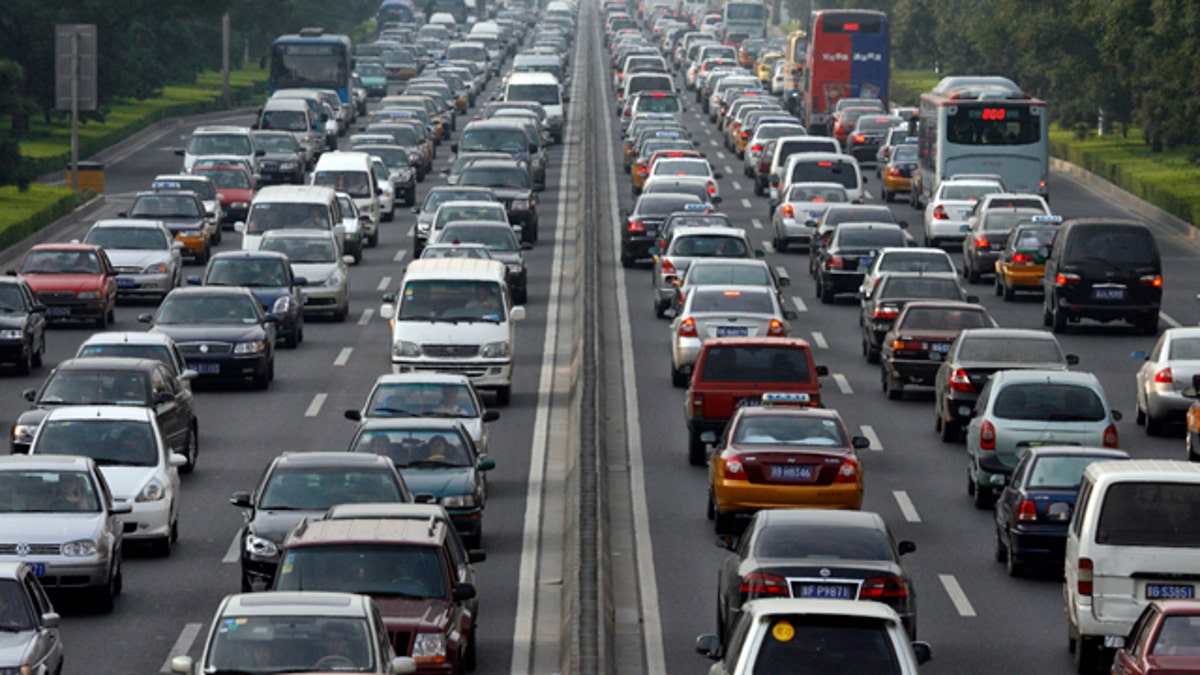
Vehicles wait during a traffic jam along a major thoroughfare in Beijing August 10, 2007. The Chinese capital will hold a test drill for keeping cars off the road during its 2008 Olympic Games, a crucial hurdle for the city beset by pollution and traffic jams, officials announced on Friday. Between Aug. 17 and 20, about 1.3 million of the city's 3 million vehicles will be ordered off the streets each day depending on whether licence plates end in an odd or even number. REUTERS/Claro Cortes IV (CHINA)
The louder the traffic near people's homes, the greater their risk of heart attack, a new study from Denmark says.
The researchers tracked more than 50,000 study participants for nearly 10 years and found that for every 10 decibels of added roadway traffic noise, the risk of heart attack increased 12 percent.
"We think traffic noise during the night is especially dangerous, because it disturbs sleep," said lead researcher Mette Sorenson of the Danish Cancer Society. But anytime you’ve been exposed to high levels of noise, "you have increased concentrations of stress hormones in your body,” which could explain the increased heart attack risk, Sorenson said.
Sorenson and her fellow researchers found that the link between heart attacks and roadways held even after accounting for the heightened levels of air pollution near roadways. They estimated that 4 percent of all heart attacks in Denmark are related to traffic noise.
Sorenson suggested choosing a room with a low exposure to traffic noise for sleeping in, or insulating one’s house against noise. It is also possible for officials to pave highways with low-noise asphalt, she said.
The real danger with noise pollution is that most people don’t realize they are experiencing it, Sorenson said.
“You might wake up thinking that you had a quiet night, but when you look at it in a lab, you see that your sleep stages have been disturbed,” she said.
For the study, the researchers asked participants to report where they lived and whether they had ever had a heart attack, along with other information, including their diets and physical activity habits. The participants’ addresses were used to assess the noise they experienced.
The researchers also accounted for factors that could affect participants' risk of heart attack, including gender, smoking, fruit and vegetable intake, and body mass index.
Noise pollution is not generally recognized as a health hazard, said Sally Lusk of the University of Michigan, adding that Europeans are generally more concerned about noise levels than U.S. residents are.
Lusk's own research has shown that exposure to high noise levels raises blood pressure; she said the new study's results did not surprise her.
“Almost everyone is listening to something that is louder than it should be,” she said,.
Noise pollution tends to be higher in cities, but Sorenson emphasized that it is possible to “live very quietly in a city but very noisily in a rural area,” particularly depending on proximity to highways.
While the link between noise pollution and heart attack risk has been shown before, the new study is one of the first to demonstrate an incremental correlation between increasing noise and increasing risk. Previous studies have shown that risk increased at noise levels above 60 decibels; this study showed that risk increased between 40 and 80 decibels.
Ten decibels of noise is enough to interrupt a conversation, while 85 decibels is the minimum level at which hearing protection is required in a workplace, Lusk said.
The study was published today (June 20) in the journal PLoS ONE.
Pass it on: Noise pollution increases heart attack risk — and the louder it gets, the higher the risk.
Follow MyHealthNewsDaily on Twitter @MyHealth_MHND. Find us on Facebook and Google+.
